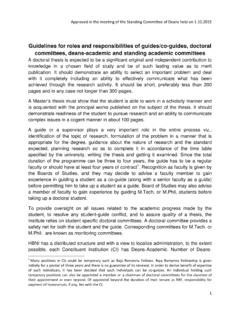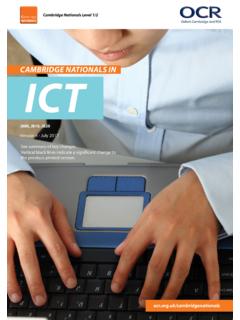Transcription of Guidelines M.Tech M.Phil. PGDip - HBNI
1 1 General Guidelines for PG diploma at BARC Training Schools HBNI 2 Preface BARC Training Schools run a one year academic programme aimed at equipping fresh engineers and scientists with a sound academic base in nuclear science and engineering. While for historical reasons, the name Training School is retained, considering the depth and the spread of courses taught, it is a Graduate School and this aspect was fully recognized when Homi Bhabha National Institute (HBNI) was accredited as a deemed to be university by the Ministry of Human Resource Development in June 2005. One year academic programme at Training School is designed to fulfill course requirements for an or programme.
2 Students desirous of getting a or have to complete a project of one year duration following successful completion of the course work. Those who are not interested in project work, get a PG diploma after successful completion of course work. Training School started functioning at Mumbai in 1957 and to meet increased manpower requirement, Schools have also been set up at RRCAT, Indore; IGCAR, Kalpakkam; NFC, Hyderabad; and AMD, Hyderabad. To date, over 8000 students have graduated from Training Schools and are now manning all important positions in the Department of Atomic Energy. Academic Vision and programmes The aim of the main programme at Training School is to attract bright young graduates in engineering or post graduates in science and nurture them academically over a period of one year to pursue a career in nuclear science and engineering thereby ensuring sustained availability of qualified manpower for the growth of nuclear power and non power applications of nuclear technology in the country.
3 The content of academic programmes being run at Training Schools and syllabi of various courses are formulated keeping in view the fact that nuclear technology is a multi disciplinary subject. The duration of one year is divided into three parts viz., semester 1, semester 2 and the summer semester and courses are categorized as foundation courses, core courses and elective/ specilaised courses. Engineering students study courses in nuclear science and engineering and also advanced courses in their basic discipline. Similarly, science students study advanced courses in their basic discipline and also courses in nuclear science.
4 Under another programme, students join units of DAE after completing and go through a specifically tailored course work of one semester to study nuclear subjects. Courses on advanced topics are also organized in the mornings and evenings for the benefit of research scholars and employees under continuing education programme. Guidelines These Guidelines supplement ordinances and have been written to facilitate implementation of ordinances. While all care has been taken to ensure that the Guidelines are compliant with ordinances, in case of any conflict, ordinances will prevail. 3 Enrolment The following categories of students are admitted to the one year course work at Training School.
5 A. Students selected for employment in DAE through a process involving screening based on performance in an all India written test conducted by BARC or GATE, and a selection interview by an expert committee nominated by BARC. b. Nominees of armed forces short listed by armed forces based on procedure internal to them and selected based on interview by an expert committee nominated by BARC. All such students enrol for c. Special cases wherein students selected by organisations such as AERB are nominated to attend full one year programme or some of the courses. d. Employees who have been asked by their divisional management to attend some of the courses to improve their knowledge base in a specified area.
6 They are given due credit for such courses whenever they want to enrol for a research based degree from HBNI. e. Faculty nominated by universities/ institutes in the country desirous of training them in nuclear science and engineering for all or some of the courses after their aptitude has been ascertained by expert committees nominated by BARC. f. Nominees sponsored by other countries as per agreements with them. All engineering students enrol for and have the option of discontinuing after getting a PG diploma on successful completion of one year of course work. Science students in most cases enrol for a PG diploma and go on to pursue a Some students, who are not in a position to commit to a long term research programme leading to a , upgrade to after successfully completing one year of course work.
7 In some applied disciplines such as lasers and accelerators, material science and radiological safety engineering, science students enrol for Students are requested to fill in appropriate enrolment form right at the time of joining Training School. Appropriate form for different categories of students is as follows. Students having a bachelors in engineering: , Students who have joined the course radiological safety engineering : , Students who have a and have joined an applied discipline such as accelerators and lasers or material science: or PGDiploma as opted by them, Students who have a and have joined science discipline: PG diploma , and Students who are attending only some of the courses: Credit courses Programme Management Calendar One Year Duration from 1st August to 31st July.
8 Inauguration on August 1. Course structure as follows Semester 1 (17 Weeks) Weeks 1 17 ( from August 1) for conducting foundation 4 and core courses Vacation( 2 Weeks) Weeks 18,19 ( 2 weeks) Semester 2 (17 Weeks) Weeks 20 36 for continuing foundation and core courses Break (5 Weeks) Weeks 37 41 for Technical Study Tour ( 1 week), Vacation (2 weeks), Administrative Workshop (3 days) and Placement Summer Semester (11 Weeks) Electives and Mini Project ( Weeks 42 52) Examination for courses are held either at the end of a semester or during mid semester as well as end semester.
9 Training Schools Committees and Faculty To ensure that highest academic standards are maintained in all programmes in all Training Schools, an Apex Committee consisting of senior professionals meets periodically and is supported by discipline wise committees. These committees approve syllabi prior to its approval by Board of Studies, select course coordinators and faculty. The TS Committees are mandated to convene meetings before the first week of July every year to take all decisions for the academic year beginning in early August. Stipend All students enrolled under category are paid a stipend at rates prescribed by DAE.
10 Residence and Attendance All students selected under category are required to stay in the Hostel. For other students, while attempts are made to provide hostel facilities on request, it is not compulsory to stay in the hostel. Maximum of 12 days medical leave (certified by the Medical Officer of BARC) allowed during the entire course period. Leave without stipend may be permitted only on account of pressing reasons. Absence from classes with prior permission is treated as leave without stipend and one mark per day is deducted from the aggregate. Absence without prior permission entails deduction of two marks per day (or part thereof) from the aggregate in addition to deduction in stipend.

